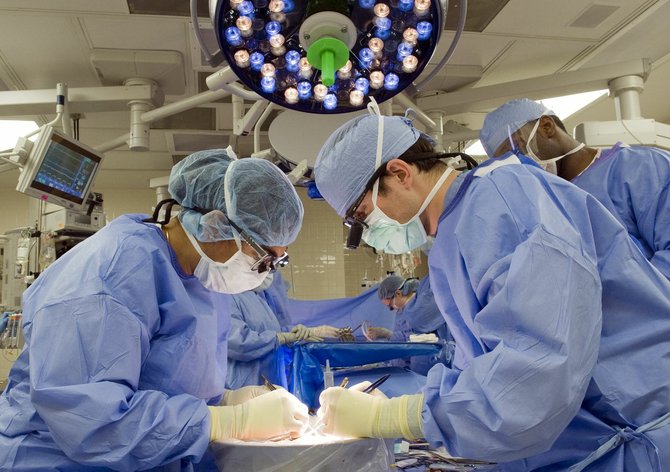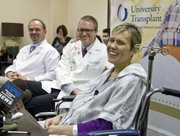Karen Battle barely had the energy to lift her feet high enough to clear an ordinary street curb just a few weeks ago. Liver disease had ravaged her health and drained her vitality. Eventually, even her sense of humor disappeared with her illness.
The night of March 3, when Battle had been living with autoimmune hepatitis for going on four years, her doctors at University of Mississippi Medical Center knew that if her condition worsened, not even a liver transplant would save her. Despite their best efforts with drugs and dialysis, they had to admit Battle, 36 and a mother of two, into UMMC's intensive-care ward after watching her condition deteriorate from week to week.
"She was, in my opinion, straddling the fence," said Dr. Christopher Anderson, associate professor of surgery and associate director of the liver transplant program at the University of Mississippi Medical Center.
Battle, who lives in south Jackson, had been on a downward spiral with what could have had an inevitable ending. Liver disease eventually affects other vital organs, Anderson said, and Battle's condition was at a point where her chances of survival were minimal.
Close to midnight, Anderson received a call from the Mississippi Organ Recovery Agency. A compatible liver was available. Did he want it?
Anderson jumped into action and called his colleague Dr. Brian Borg, the medical director of the liver transplant team. Less than 24 hours later, Battle was in surgery. The morning of March 5, she had a healthy liver and was on the road to recovery.
"I feel like I won the lottery," Battle told reporters March 14. Sitting next to Anderson and Borg in a wheelchair, she couldn't stop smiling, even when her voice choked with emotion.
"If it weren't for the donor and the donor's family giving up a precious gift, I wouldn't be here," she said, adding that she would love to meet the family of the person who made her life possible.
Battle is the first patient to receive a liver transplant at UMMC in more than 22 years. The hospital recruited Anderson in 2011 to revive the program, and he has spent the last two years putting a talented team together. In January, the transplant program had met all of the requirements to restart transplants and gained approval from the United Network for Organ Sharing, or UNOS.
Even with everything in place, Battle's fragile condition "had a lot of people on edge," Anderson said, and the team had to manage a number of unanticipated variables.
"Her care was not the easiest," Borg added.
For more than two decades, Mississippians with liver disease had to go out of state to receive the kind of complete medical care that UMMC is now able to provide. Annually, about 50 to 60 patients had to go elsewhere when transplants became necessary, and Anderson believes that, in that time, some Mississippians just didn't get the care they needed. Patients generally will do better when they're close to home, he said.
Battle's liver transplant is on track to fulfilling Anderson's--and UMMC's--vision: He wants the department to be a complete, functional abdominal transplant center, which includes kidneys and pancreas as well as liver.
The two doctors were effusive in their praise for the transplant team--the doctors, nurses, technicians and even administrators--who made it possible. But this day, Anderson said, was about Battle, whom he would be discharging later in the day.
"More people should donate," Battle said, to make their last act one that helps someone else.
She's looking forward to enjoying life again, especially the little things: being outside, being part of her children's activities, going to the movies and sleeping in her own bed again.
"I'm not going to take anything for granted," Battle said.




Comments
Use the comment form below to begin a discussion about this content.
comments powered by Disqus